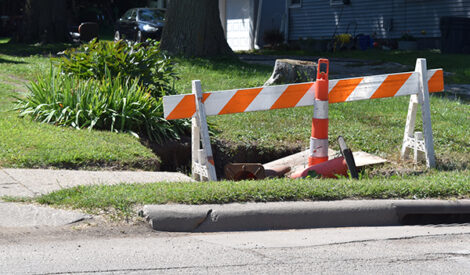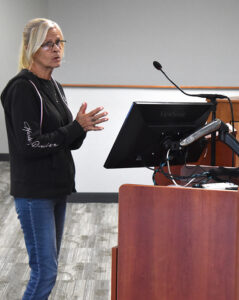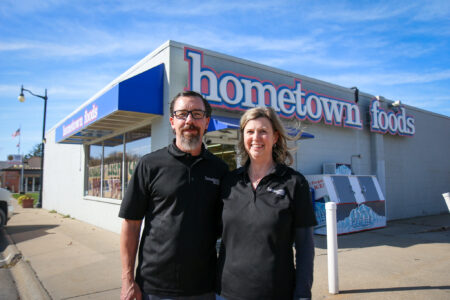Council declines to take action or responsibility on May Street sewer dispute
A decades old dispute over a privately installed storm sewer line on May Street came up for discussion during Monday night’s city council meeting, and the council ultimately voted 4-3 against taking action to fix the issue, citing the property owner’s previous refusal to allow an easement and the lack of documentation that the city had ever formally signed off on the installation in the first place.
The matter was brought up at the request of Councilor Gary Thompson, and City Administrator Carol Webb explained that the sidewalk at 1001 May St. in front of the home of Kim Barber had failed and continues to fail due to the privately installed storm sewer pipe. A formal notice was sent to Barber on July 18 demanding a repair with a compliance date of Aug. 27.
Thompson described the situation as “a tough one” because a group of residents in the neighborhood had worked with the city years ago to put a private system in as a means of controlling stormwater runoff that connected a stormwater sewer on Anson Street to one on May Street.
“As a city councilor today, I can’t change what happened in the past, but what I struggle with is the residents had to have permission to hook up into the city system. There had to be an engineering oversight 40, 50, 60 years ago, whenever this was, that when they hooked their private stormwater system into the sewer blocks, the square blocks that hold the sewer system intakes, I’ve got to believe an engineer had to sign off on that and that no one can just go out and hook up something to a sewer system,” Thompson said. “So I’ve got to believe that the city itself has some onus on this… It looks as if the joint is what’s failed between the pipe and the box collector under the sewer on May Street, and I think over the years, it has just eroded the dirt away, the rock, whatever, and now the sidewalk above it has caved in. And I think that void was there for years, and the sidewalk above it held its place for years. And it finally caved in this year, so I struggle with the resident having to pay for this because it truly was the joint that failed.”
He added that he understood easement offers had been made in the past, but such an agreement would not allow the owner to build over it. Ultimately, he felt the city should be responsible for the repair. Councilor and Mayor Pro Tem Mike Ladehoff countered that the city had no evidence it had ever been accepted or agreed that the city would perform maintenance.
Ladehoff said the city didn’t have the manpower, staff or funding to do it based on his conversation with Public Works Director Heather Thomas. Thompson responded that if the council decided the homeowners in the neighborhood were responsible, they could cap off the line at the source, and he wondered what the recourse would be in that scenario.
He suggested using Local Option Sales Tax (LOST) money to fix the seam, backfill it, put the sidewalk in, “lick their wounds” and move forward. Webb welcomed Thomas to address it, and she said it wasn’t an issue of manpower or staff but noted the history of unsuccessfully attempting to secure easements.
“The city has no authority to go in on this property and address the issue. So it’s not that we don’t currently have availability, it’s that city staff has already spent this time multiple times trying to get this result, and the property owner that has said no so many times continues to say no. And we are not going to continue to beat a dead horse when we’ve been told so many times,” Thomas said.
She added that she was not convinced the storm sewer further south draining to it was in place when the private line was installed. That prompted Thompson to ask whether the city knowingly connected one of its collection points into a private line. Thomas said that was her guess but deferred to Iowa drainage law and suggested that if a property owner tried to block it, they would open themselves up to legal liability.
She reiterated that the city’s hands were tied without an easement in place, and Thompson then motioned to bring back a resolution using LOST to fix the sidewalk and avoid rehashing “he said, she said” arguments over who was at fault. After Councilor Mark Mitchell seconded it, Councilor Barry Kell commented that until the property owner was willing to work with the city and sign an easement, the council shouldn’t take any action.
Thompson rebutted that the onus shouldn’t fall on one specific homeowner, and the sidewalk needed to be fixed regardless. Councilor Greg Nichols asked which homeowners had been reluctant to sign an easement in the past, and Thomas said there were two including Barber.
During the public comment period, Jim Shaw wondered if an easement could still be secured now, and Doris Kinnick asked if Marshalltown Water Works had been notified of the issue. Barber, who was in attendance at the meeting and has lived in the house since she was a child, then came forward and sought to clarify some of the history through multiple generations of her family. She has owned the house since 2004 and said she was advised by attorneys not to sign an easement without a full understanding of what was going on at the time.
“Four or five years ago, it started to put holes in the back of my yard,” she said. “In my back corner, it started to cave in back there, so once again, I came with… the water works people, and it just got to be overwhelming. I’m promised this, then not, then yes, then not, then yes, an easement again. I would be glad to sign an easement. I’ve been wanting to sign an easement for years, but four or five years ago, I finally had had enough.”
Her son tiles for a living, so Barber said they hired Ricken Tiling to work on it. She initially contacted Ladehoff two years ago, and the hole has only gotten bigger since then, eventually caving in the sidewalk. She reiterated that she would sign an easement now but felt more damage has accumulated and would be her responsibility.
Ladehoff asked Webb what the city’s position was, and she replied that it was a private stormwater line and not the city’s obligation. Councilor Melisa Fonseca sought clarification on what a $25,000 figure listed in the council packet would entail, and Webb said it was “a threshold amount,” adding that anything over that would require performance and payment bonds.
Fonseca’s concern was the potential effect on numerous property owners and wondered if a cost share agreement could be reached to resolve the issue and “do it right.” Webb said the city was still willing to work with the landowners but felt the pertinent question was who is responsible for the current condition of the storm sewer pipe.
“The city is saying that we wouldn’t accept responsibility for the current condition. Going forward, we can have an easement so that we can maintain the line properly,” Webb said.
Thompson cited the example of other areas where contractors build streets and the city takes ownership, eventually using taxpayer money to repair them. Because it is hooked up to the city sewer system and the city uses and benefits from it, he felt it should be the city’s responsibility.
Nichols again asked if Barber would be willing to sign an easement now, and she said yes. Thomas noted that Barber was hesitant to sign the easement in the past due to a specific clause absolving the city of liability for damage caused by the installation of the storm sewer pipe or liability for installing a new fence if a repair is required, which the city still feels should be included.
Barber returned to the podium and said that was true, but she has since fixed “everything” and is no longer expecting anything to be fixed despite the extensive out of pocket costs she has already incurred. Ladehoff asked Thomas if the line itself was proper, and she said it was not installed up to modern specifications.
“No storm sewer is intended to handle all water, and that’s part of the concern with the easement is when there are buildings and fences and everything on top of this stormwater flow path, it’s easy in the future to point fingers at the city and say ‘You damaged my fence.’ But if this is where stormwater flows, my recommendation is my predecessor’s recommendation and his predecessor’s recommendation from every finding that I can find is that the city doesn’t take liability for those items,” she said. “And that’s been the sticking point.”
Councilor Jeff Schneider didn’t believe Thompson’s analogy was fair as the city hasn’t accepted responsibility for the situation, and he didn’t feel they should. Thompson’s original motion failed by a 4-3 tally with Fonseca, Mitchell and Thompson in favor and Kell, Ladehoff, Nichols and Schneider opposed.
——
Contact Robert Maharry
at 641-753-6611 ext. 255 or rmaharry@timesrepublican.com.
- T-R PHOTOS BY ROBERT MAHARRY — A view of the collapsed sidewalk at 1001 May St. in front of the home of Kim Barber. During Monday night’s meeting, the city council voted 4-3 against taking action to repair it with Local Option Sales Tax (LOST) dollars, with those who opposed Councilor Gary Thompson’s motion citing a privately installed storm sewer line causing the issue and past unsuccessful attempts to secure an easement on the property.
- Kim Barber, the owner of the property at 1001 May St., addresses the city council during Monday night’s meeting







